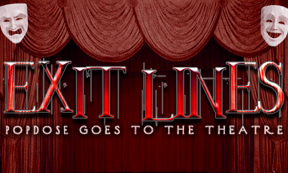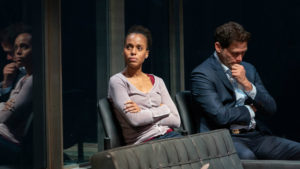 I’ve watched Belgian director Ivo van Hove deconstruct and reupholster classic texts since an outstanding Off Broadway production of The Misanthrope in 2007. It used video to immerse us more fully in the world of MoliÁ¨re, and broke the fourth wall in novel ways, as when the actors headed outside the theater for a scene, followed by videographers. Since then Broadway has embraced his vision, with acclaimed, award-winning productions of A View from the Bridge and The Crucible blowing the dust of decades off Arthur Miller with fusillades of modernist touches, some more inspired than others.
I’ve watched Belgian director Ivo van Hove deconstruct and reupholster classic texts since an outstanding Off Broadway production of The Misanthrope in 2007. It used video to immerse us more fully in the world of MoliÁ¨re, and broke the fourth wall in novel ways, as when the actors headed outside the theater for a scene, followed by videographers. Since then Broadway has embraced his vision, with acclaimed, award-winning productions of A View from the Bridge and The Crucible blowing the dust of decades off Arthur Miller with fusillades of modernist touches, some more inspired than others.
If you’ve never been in the vanHoveverse, chances are you’ll appreciate what he’s done with Paddy Chayefsky’s Oscar-winning screenplay Network. Befitting a show that takes place largely in a TV station circa 1976 there’s tons of video (the very busy videographers here deserve a special Tony citation), onstage seating for some of the audience and participatory opportunities for all, and…a scene played outside the theater, as Santas from the day’s Santacon strolled by the night I saw it. That relieved the dÁ©jÁ vu that hung over the moment–you can only break the fourth wall so much, and van Hove is using the same hammer, this time on material that well and truly shows its age.
What everyone remembers about Network is the “mad as hell” speech, as anchorman Howard Beale, dubbed “the mad prophet of the airwaves” as he channels anger and makes a Lazarus-like comeback from near-death ratings, shocks viewers to their senses. Going out with a blaze of glory, fellow (posthumous) Oscar winner Peter Finch made Chayefsky’s words incandescent on film, a display in stark relief from Sidney Lumet’s crepuscular direction of the rest of the screenwriter’s bleak satire. You may not remember much more of it, as news division chief Max (William Holden) frets about his old friend’s declining sanity while none-too-believably carrying on an affair with Beale’s chief exploiter, shark-like producer Diana (Faye Dunaway, in her Oscar role). In an aside long enough to win Beatrice Straight an Oscar, Max’s wife bares her anguish to him in one scene, as the suits and corporate interests begin to resent Beale’s biting the hand that feeds him. Beyond the newscaster’s on-air jeremiads the film is painfully overwritten, and Lumet and a cast that includes Robert Duvall and Ned Beatty as the suits and corporate interests allied in increasing resentment toward the Beale phenomenon labor to rein it in. Van Hove elects to set off fireworks around the gaseous, Trumpian-sounding bromides (Chayefsky was the kind of liberal who abhorred other liberals) and he and adaptor Lee Hall (Billy Elliot the Musical) put Beale more at the center of it.
 This is an exceedingly wise decision, as Bryan Cranston is magnificent in the part, which has been expanded in some small ways. He has to be good not to be wiped out by all the electronic geegaws around him, and he delivers a forceful, funny performance that (almost) had me shouting “I’m mad as hell and not going to take it anymore!” in response to his revivalist fervor. He’s maybe too ingratiating–I’ve rarely seen an actor as comfortable going into the audience and chatting in character. (During my performance the indefatigable videographers captured Phil Donahue and Marlo Thomas sitting behind him, in an amusing meta-moment.) But Cranston gives us something, which the other actors fail to do. The inventive Emmy-winning actress Tatiana Maslany is as compelling as a test pattern as Diana, and Tony Goldwyn, though the same age (58) as the weathered Holden when he made the film, is far too hale and youthful-looking for Chayefsky’s “winter passions.” (Oh, that scene with Louise, Max’s wronged wife. I was sure they cut it, but then it turns up, in all its agonizing tedium.)
This is an exceedingly wise decision, as Bryan Cranston is magnificent in the part, which has been expanded in some small ways. He has to be good not to be wiped out by all the electronic geegaws around him, and he delivers a forceful, funny performance that (almost) had me shouting “I’m mad as hell and not going to take it anymore!” in response to his revivalist fervor. He’s maybe too ingratiating–I’ve rarely seen an actor as comfortable going into the audience and chatting in character. (During my performance the indefatigable videographers captured Phil Donahue and Marlo Thomas sitting behind him, in an amusing meta-moment.) But Cranston gives us something, which the other actors fail to do. The inventive Emmy-winning actress Tatiana Maslany is as compelling as a test pattern as Diana, and Tony Goldwyn, though the same age (58) as the weathered Holden when he made the film, is far too hale and youthful-looking for Chayefsky’s “winter passions.” (Oh, that scene with Louise, Max’s wronged wife. I was sure they cut it, but then it turns up, in all its agonizing tedium.)
Van Hove does score with an unexpected post-curtain call flourish that brings Network up to date, in the manner of Spike Lee’s BlackKlansman. In 1976, it was far-fetched that there could be a fourth TV network that would find its voice spewing government-spun propaganda, yet here we are. Our daily reality show has long overtaken Chayefsky’s, and makes it look cozy in comparison. Cranston gives this gimmicky theatrical resurrection its vitality–it’s pretty much a one-man show with other people–but this is a Network that is weirdly sentimental about Network. Time to change the channel.
 American Son begins with that facile title and goes steadily downhill from there. Since at least American Beauty in 1999 “American” as an adjective has been used disapprovingly, cynically, or ironically, to prepare us for a sour story of lost idealism and curdled lives. Late on a sodden night in Miami, Kendra (Kerry Washington) sits anxiously in a police station, awaiting word on her 18-year-old son, Jamal. There’s been some sort of an encounter with the cops, and he may be in custody, but the manner of a inexperienced, overbearing officer (Jeremy Jordan) adds to her worries. Christopher Demos-Brown’s playwriting is on the level of Twitter exchanges as the two snap at each other, and the horrors of young black men at the hands of the police are broached. Acting as middleman is Kendra’s estranged husband, Scott (Steven Pasquale), an FBI agent who grouses about the crowd straight-arrow Jamal has fallen in with since his departure. Offering occasional dispatches as the situation coagulates into race-baiting and recrimination is a senior policeman (Eugene Lee).
American Son begins with that facile title and goes steadily downhill from there. Since at least American Beauty in 1999 “American” as an adjective has been used disapprovingly, cynically, or ironically, to prepare us for a sour story of lost idealism and curdled lives. Late on a sodden night in Miami, Kendra (Kerry Washington) sits anxiously in a police station, awaiting word on her 18-year-old son, Jamal. There’s been some sort of an encounter with the cops, and he may be in custody, but the manner of a inexperienced, overbearing officer (Jeremy Jordan) adds to her worries. Christopher Demos-Brown’s playwriting is on the level of Twitter exchanges as the two snap at each other, and the horrors of young black men at the hands of the police are broached. Acting as middleman is Kendra’s estranged husband, Scott (Steven Pasquale), an FBI agent who grouses about the crowd straight-arrow Jamal has fallen in with since his departure. Offering occasional dispatches as the situation coagulates into race-baiting and recrimination is a senior policeman (Eugene Lee).
The ongoing saga of black youths and cops is a dismal one, but Demos-Brown offers only heat, and no light. Jamal is a straw boy, constructed from headlines, and the characters pull apart his ideological stuffing. Kendra, a psych professor, speaks up for his many good qualities, but her white husband and the two policemen are more ambivalent, questioning his friendships and the “Shoot Cops” sticker emblazoned on his new car. Fresh from Scandal, Washington works hard to animate the position papers the playwright has her swat Supergirl and musicals veteran Jordan over the head with, yet the portrayal never deepens past a raging frustration. Sympathy from the mixed-race audience I saw the play with was more audibly with Scott (Pasquale played Mark Fuhrman in the American Crime Story: The People vs. O.J. Simpson miniseries) and the elder, hard-nosed black cop, which could not have been intended.
Perhaps Jamal could have spoken up for himself, but we never hear from him. Instead the thin material takes a further unfortunate swerve into outright melodrama, with thunderclaps and a deus ex heart murmur. Many unsatisfying plays end where they might begin, and American Son, directed with a surfaces-only efficiency by Kenny Leon, doesn’t break the pattern. Worse, it ends up exploiting a tragedy, rather than exploring it.





Comments